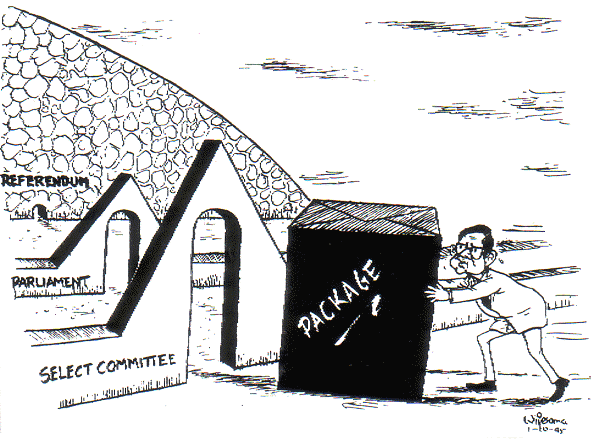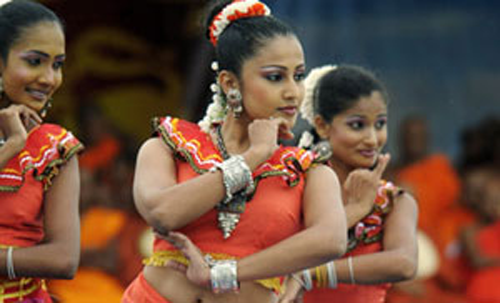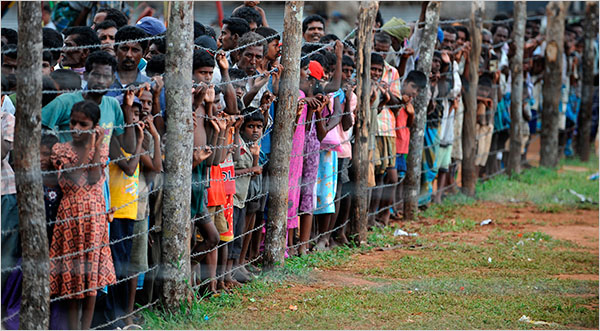|
Liberation Tigers of
Tamil Eelam
Anita Pratap on 'Lessons to be
learnt from the rout of the LTTE'
31 May 2009
  
Comment by tamilnation.org
Et Tu Anita Pratap! Anita Pratap has
unburdened herself in The Week (31 May 2009) on the 'lessons to
be learned from the rout of the LTTE'. Yes, Anita
Pratap is right to say that there are lessons to be
learnt from the rout of the LTTE. One lesson is that
-
"...Where national memories are
concerned, griefs are of more value than triumphs,
for they impose duties, and require a common effort.
A nation is therefore a large-scale solidarity,
constituted by the feeling of the sacrifices that one
has made in the past and of those that one is
prepared to make in the future... " What is a Nation? (Qu'est-ce qu'une
nation?)Ernest Renan, Lecture at Sorbonne, 11 March
1882
Another lesson that the Tamils have
been taught is that though power may flow through the
barrel of the gun, the problem with war will always
remain with the victor.
"..The problem with war is always
with the 'victor', because he (or she) has
demonstrated that superior force pays - and, sooner
rather than later, there will be those who will rise
to show that they have learnt well the lesson that
was taught..." Nadesan Satyendra in Conflict Resolution
in an Asymmetric Multi Lateral World, 10 May
2004
Yes, there are many more lessons that
the Tamil people will need to learn from the military
defeat of the LTTE - and the Tamil people living not
only in Tamil Eelam but in many lands and across
distant seas will learn. But they do not need lectures
on that score from the Anita Prataps of the world.
Be that as it may, Anita Pratap has
taught the Tamil people some lessons of her own. Anita
Pratap who years ago served as CNN South Asian Bureau
Chief, and who clearly valued her access to Velupillai
Prabhakaran when he was alive, has taught the Tamil
people the truth of something which Robert Parry said
in 2003 -
"...The notion of a "liberal"
national news media is one of the most enduring and
influential political myths... Some concessions are
made to the broader professional standards of
journalism, such as the principles of objectivity and
fairness. But media owners historically have enforced
their political views and other preferences by
installing senior editors whose careers depend on
delivering a news product that fits with the owner's
prejudices. Mid-level editors and reporters who stray
too far from the prescribed path can expect to be
demoted or fired. Editorial employees intuitively
understand the career risks of going beyond the
boundaries..." Robert Parry in
Price of the 'Liberal Media' Myth, 2003
Anita Pratap has taught the Tamil
people that the so called 'liberal media' is a
political myth. She has taught the Tamil people that
their freedom does not lie in the hands of editorial
employees of the 'liberal media' who 'intuitively
understand the career risks of going beyond the
boundaries'. She has taught the Tamil people that it is
a vain dream to suppose that what other nations have
won by suffering and tears of blood, they will
accomplish without terrible sacrifices, merely by
spending the ink of the journalist.
"...It is a vain dream to suppose
that what other nations have won by struggle and
battle, by suffering and tears of blood, we shall be
allowed to accomplish easily, without terrible
sacrifices, merely by spending the ink of the
journalist..." Sri Aurobindo
It was less than an year ago in July
2008, Anita Pratap declared -
"... Prabhakaran is a patient man. I
have never seen him waste his time. His brain is at
all times actively and ceaselessly engaged with the
issues that concern the struggle.In todays world if
there is one freedom movement which is totally
disciplined and which is loyal to and trusts its
leadership it is the Liberation Tigers alone. I have
the belief that I will one day go to Ilankai, meet
with Prabhakaran and write the history of his life...
"
It was less than a month ago on
3 May 2009
that Anita Pratap waxed eloquent -
".. I am certain he (Prabhakarn) is neither
frightened nor desperate...He is very clear in his
mind - he is fighting to liberate his people. For
that principle he lives. For that principle he
fights. And for that principle he is willing to die.
Victories and defeats come and go. Territories are
lost and won. Cadres die, comrades betray. But to his
dying breath, he will remain true to
Eelam...Prabhakaran has lost wars before. He had
created a de facto Tamil Eelam with its own army,
police, courts and taxation system not once, but
several times in the past-only to have it all smashed
and wiped out. And he had to start all over again. At
54, Prabhakaran still has enough grit to start again
and continue for another 20 years. ""
Today, 27 days later, she speaks of
'the cosmic and personal lessons to be learnt' from the
rout of the LTTE!
"There are also cosmic and personal
lessons to be learnt. Prabhakaran died on May 17, as
the Congress was celebrating its Lok Sabha election
victory that is credited to Sonia and Rahul Gandhi.
This is divine retribution for Prabhakaran, who
killed Rajiv Gandhi. Rajiv had his critics, but he
was a decent man who simply didn't deserve his brutal
death. The timing of events proves the triumph of
democratically and non-violently vanquishing one's
enemies-in stark contrast to Prabhakaran's vengeful
tactics. "
Anita Pratap's recourse to the divine
metaphor may be understandable - understandable, that
is, as an instance of career driven journalese. But the
ways of the divine are not always understood by mere
mortals. Many Tamils may take the view that the killing
of Rajiv Gandhi was itself a divine retribution for the
war crimes committed by the Indian Peace Keeping Force
under his command in 1987 -
"..the Indian Army came here,
massacred innocent Tamil civilians,
raped our
women and plundered our valuables. The
acronym IPKF will always stand for Indian People
Killing Force where we are concerned. We will one day
erect a memorial in the heart of Jaffna town, in the
centre of Hospital Road, in memory of all the
innocent civilians - ranging in age from the very old
past 80 to young children massacred by the IPKF and
to the women who were raped." IPKF - Innocent People Killing
Force, Dr. T. Somasekaram
Tamil civilians killed by the
IPKF... Dr A. Sivapathasuntheram,
Dr M.K. Ganesharatnam, Dr
Parimelalahar, Mrs
Vadivelu, Mrs Leelawathie, Mrs
Sivapakiam, Mrs Ramanathan, Mr
Shanmugalingam, Mr
Kanagalingam, Mr
Krishnarajah, Mr
Selvarajah, R. Duraiswamy (SLAS) Retd. Secretary,
Ministry of Local Government. M. Duraiwswamy Retd.
Staff Officer Bank of Ceylon, Mr. S. Sivasubramaniam,
retired Director of Irrigation, Mrs. Sivasubramaniam,
his retired teacher wife and their only son, Prof.
P. Chandrasekeram, University of Jaffna, Dr R.W.
Crossette Thambiah, Dr Selvaratnam Former DMO
Maskeliya, Dr S. Pararajasingham J.M.O, L.F.M. Samuel
Rtd. Teacher (St. Thomas College, Mt. Lavinia &
Royal College), K.J. Sambanthar Retd. DLO & Asst.
Land Commissioner, Jaffna, Mrs S. Sivanandaraja
(mother), Mohanraj (son) Technical Officer,
Irrigation .Dept, Mrs Kishnam, Mrs M.
Sebastiampillai, Mrs N.R. Thuriappa, Mrs V.
Ruthiralingam, C.S. Aaron, A. Subramanium Attorney at
Law, Mr & Mrs Pancharatnam, Rtd. Teachers, K.
Navaratnam Rtd. Divisional Supdt. of Post Offices, S.
Nadarajah, Formerly SLBC, Tamil Service, P. Arooran ,
M. Nadaraja, S. Rasanayagam Rtd. Credit Controller
CCC Ltd., Mrs M. Weerasegaram Pillai, (Mother),
Pillai Yasotha Weerasegaram (Daughter), Mrs S.
Thanapalasingham (Mother) Miss N. Thanapalasingham
(Daughter) S. Kulasegerampillai, Retd. Station
Master, Mrs M. Arumugam (sister of
Senator S.Nadesan), Mrs R. Gnanamuttu , A.
Candappu Rtd. State Officer, S. Selvaranee, S.
Shanmugasuntharam, Electrician, Jaffna Municipal
Council, S. Thambiah, (father of T. Sabaratnam), Mrs.
Thambimuttu, Kannan Iyer, . Mr. V. Subramaniam, 60
yrs Vithanai Lane, Mrs. Illayaperumal Umaranee, 29
yrs; Mr. A. Illayaperumal, 70 yrs;
Mrs. R. Pushparani, 45 yrs; Mast. R. Javanaraj, 11
yrs; Mast. A. Sundereswaran, 11 yrs; Mr. S.
Ganeshalingam, 35 yrs; Miss. Ganeshalingam Sashi,
11/2 yrs; Mrs. Airtham Umadevi, 26 yrs; Mr. A.
Ramachandran, 41 yrs; Mr. K. Sivanesarajah, 36 yrs;
Mr. P. Ranjithamumar, 25 yrs; Mr. N. Raveenthiran, 32
yrs; Mr. K. Mahenthirarajah, 49 yrs; Mr. K.
Velummylum, 42 yrs; Mr. R. Nadarajah, 62 yrs ; Mr. V.
Arulsothy, 28 yrs ; Mrs. Kandasamy Sivapackiam, 45
yrs, Palavi; Mr. R. Rasaratnam, 34 yrs,
Sivankovilandy,; Mr. K. Thangarasa, 60 yrs, Palavi
Colony;; Mr. B. Premraj, 22 yrs, Theeruvil Lane;; Mr.
S. Umasankar, I9 yrs, Kadduvalavu Lane;; Mr. T.
Ravichandran, 28 yrs, Kadduvalavu Lane;; Mr. S.
Mylvaganam, 55 yrs, Oorany; Mr. T. Nagadas, 28 yrs,
Kadduvalavu Lane;; Mr. B. Mahenthirarasa, 16 yrs,
Vembady Lane;; Mr. R. Navaratnam, 29 yrs, Oodakarai
Lane;; Mr. S. Thambithurai, 62 yrs, Sivaguru
Vidyalaya; Mast. Nagalingam Piruntha, 14 yrs,
Navalady; Mr. Arulsothy Ravennthiran, 17 yrs; Mr.
Arulpiragasam Swanathas, 18 yrs, A.G.A. Lane; Mrs.
Selvaratnam Sivamany, 35 yrs, Colony; Mrs. P.V.
Krishnavathana, 35 yrs, Udayamanal;; Mr. K.
Shanmugavadivel, 36 yts, Kadduvalavu lane; Mr.
Kuddipavun, 30 yrs; Mr. S. Amuthan Markandu, 29 Yrs,
Vithanai Lane;; Mrs. Eswaramoorthy Rajaledchumy, 26
yrs; Mast. Aathy Arunasalam paramsothy, 17 yrs; Mrs.
Nadarajah Nallamuthu, 70 yrs, Vevil Lane;; Mr. P.
Shamugalingam, 43 yrs; Mr. Kumaravel Selvanathavel,
19 yrs; Mr. Pooniah Kalidas , 25 yrs; Mr. N.
Panugopal, 23 yrs; Mr. Wijeratnam Muraleetharan, 20
yrs, Colony; Mr. Sothilingam Rameshkumar, I8 yrs;
Mr. Ponnuthurai Rasenthiram, 23 yrs, Aathikovilady;
Mr. Velummylum Selvachandran, 26 yrs, Kotiyal; Mr. K.
Rajasekaran, 20 yrs; Mr. S. Durairaja, 59 yrs; Mr.
Sakthivel, 23 yrs; Mr. T. Sivakumar, 19 yrs; Mr. T.
Jeyamohan, 16 yrs; Mr. A. Parasar, 18 yrs; Mr. T.
Sambasivam, I8 yrs; Mr. S. Perinbam, 18, yrs,; Mr. C.
Yogarajah, 18 yrs; Mr. P. Sathiyarupan, 23 yrs; Mr.
S. Sivalingam, 49 yrs; Mr. N. Nagarajah,; Mr. N.
Sivakumar, 18 yrs; Mr. A. Mathivanan, I7 yrs; Mr. S.
Balachandramoorthy, 31 yrs... and thousands
more...
"...as an Indian I feel ashamed that
under the Indo Sri Lanka agreement, our forces are
fighting with Tamils whom they went to protect...I
believe that the Indian Government had betrayed its
own culture and ethics...The guilt, therefore, rests
entirely on those who sent them to do this dastardly
business of fighting in Sri Lanka against our Tamil
brothers and sisters..." India's
former Foreign Secretary, A.P.Venkateshwaran,
speaking in London in April 1988
Unlike India's former
Foreign Secretary, A.P.Venkateshwaran, it seems
that Anita Pratap has no feelings of shame. For
Mr.Venkateshwaran, the guilt for the actions of the
IPKF rested entirely on those who sent the IPKF to do
this 'dastardly business of fighting in Sri Lanka
against our Tamil brothers and sisters'. For Anita
Pratap, Mr.Rajiv Gandhi, the Commander in Chief who
sent the IPKF to do this 'dastardly business' was a
'decent man'.
And then, from the divine, Anita Pratap
descends to the 'personal level' and pop psychology and
speaks patronisingly of Prabhakaran's failure to learn
the lesson that 'compromise is not opportunism but the
art of survival' -
"... the lesson to be learnt at the
personal level is that inflexibility is a fatal flaw.
Compromise is not opportunism, but the art of
survival. Prabhakaran had four reasonable chances for
a peaceful settlement-in 1987 with India, in 1990
with R. Premadasa, in 1994 with Chandrika Kumaratunga
and in 2003 with Ranil Wickramasinghe through the
Norway-brokered peace process."
Inflexibility is a fatal flaw.
Compromise is not opportunism. It is an art form. And
survival is an art. George Orwell could not have put
it better in 1984. It may be that survival as an art
form is something which Anita Pratap is well qualified
to talk about. But she errs in extending her life
experience to those who, unlike her, have been willing
to put their lives on line in a struggle to win freedom
for their people. She herself may hopefully gain - at
the personal level - by learning some lessons from
the lives of those who were inflexible in their
commitment to freedom and who were not concerned with
surviving without freedom - persons such as Baghat
Singh, Subhas Chandra Bose and Velupillai
Prabhakaran himself.
''..It is our
duty to pay for our liberty with our own blood. The
freedom that we shall win through our sacrifice and
exertions, we shall be able to preserve with our own
strength.... Freedom is not given, it is
taken.. One individual may die for an idea;
but that idea will, after his death, incarnate itself
in a thousand lives. That is how the wheel of
evolution moves on and the ideas and dreams of one
nation are bequeathed to the next......' Netaji Subhas Chandra
Bose'
"...Subhash Chandra Bose's life was a
beacon to me, lighting up the path I should follow.
His disciplined life and his total commitment and
dedication to the cause of his country's freedom
deeply impressed me and served as my guiding
light..." Velupillai Prabhakaran, 'How I Became
a Freedom Fighter', April 1994
Anita Pratap may then learn that those
who die for freedom do not die - they survive in the
hearts and minds of millions. That perhaps is the
ultimate 'art of survival'.
வாழ்ந்தவர்
கோடி
மறைந்தவர்
கோடி
மக்களின்
மனதில்
நிற்பவர்
யார்
மாபெரும்
வீரர்
மானம்
காப்போர்
சரித்திரம்
தனிலே
நிற்க்கின்றார்
- Kaviarasu
Kannadasan
" When there are
many men without honor, there are always others who
bear in themselves the honor of many men. These are
the men who rebel with great force against those who
steal the people's freedom, that is to say, against
those who steal honor itself. In those men thousands more are
contained, an entire people is contained, human
dignity is contained .." Fidel
Castro
Be that as it may, let us examine the
four so called 'reasonable chances for a peaceful
settlement' which Anita Pratap says that Prabhakaran
(the 'patient man' with a 'clear mind') should have
taken so the struggle may survive. We will not take
too much time.
Anita Pratap would have us believe that
the 1987 Indo Sri Lanka Accord and the
comic opera reforms of the 13th
Amendment was a 'reasonable' settlement that
Prabhakaran should have welcomed. She would have us
believe that the Tamil Eelam struggle for freedom would
have survived by accepting a Sinhala Provincial
Governor appointed by a Sinhala President to rule the
Tamil homeland.
 "...The blunt
reality is that those who proclaim that the 13th
Amendment is intended to share power between the
Tamil people and the Sinhala people, are, to use a
colloquialism, 'trying to pull a fast one' on the
Tamil people. Under the 13th Amendment power will
continue to reside in a Sinhala dominated Central
government, within the frame of an unitary
constitution. The 13th Amendment is intended to
secure a constitutional frame which will enable a
Sinhala majority to manage the Tamil people more
effectively than before. It has created Provincial
Ministers who will not exercise executive power but
who will have executive power exercised 'through'
them!. At the same time it has created a Provincial
Governor appointed by the Sinhala President who will
exercise executive power in respect of provincial
matters - a Provincial Governor who is also the
administrative head of the provincial public service
and who has control of the Provincial Finance Fund.
And the 13th Amendment has created a Provincial
Council without control of planning, without control
of the provincial budget, without control of police
and public order within the province, without control
of disposition of state land within the province,
without control of higher education and whose
remaining meagre legislative powers are subject to
the over riding will of the Central Parliament.
Finally, the provisions of the Provincial Councils
Act itself may be amended from time to time by a
simple majority of members present and voting in
Parliament" 13th Amendment to Sri Lanka
Constitution - Devolution or Comic Opera?,
1988 "...The blunt
reality is that those who proclaim that the 13th
Amendment is intended to share power between the
Tamil people and the Sinhala people, are, to use a
colloquialism, 'trying to pull a fast one' on the
Tamil people. Under the 13th Amendment power will
continue to reside in a Sinhala dominated Central
government, within the frame of an unitary
constitution. The 13th Amendment is intended to
secure a constitutional frame which will enable a
Sinhala majority to manage the Tamil people more
effectively than before. It has created Provincial
Ministers who will not exercise executive power but
who will have executive power exercised 'through'
them!. At the same time it has created a Provincial
Governor appointed by the Sinhala President who will
exercise executive power in respect of provincial
matters - a Provincial Governor who is also the
administrative head of the provincial public service
and who has control of the Provincial Finance Fund.
And the 13th Amendment has created a Provincial
Council without control of planning, without control
of the provincial budget, without control of police
and public order within the province, without control
of disposition of state land within the province,
without control of higher education and whose
remaining meagre legislative powers are subject to
the over riding will of the Central Parliament.
Finally, the provisions of the Provincial Councils
Act itself may be amended from time to time by a
simple majority of members present and voting in
Parliament" 13th Amendment to Sri Lanka
Constitution - Devolution or Comic Opera?,
1988
Anita Pratap would have use believe
that there was a reasonable chance for a peaceful
settlement in 1990 with President R. Premadasa which
Prabhakaran should have grabbed. The words of Bradman
Weerakone, Adviser to President Premadasa give the lie
direct to Anita Pratap -
"...There was also the practical problem (in 1990)
of how free elections could be held at all in the
North East even if the North East Provincial Council
was dissolved but this was never a matter of serious
discussion between the two parties. Why were these
critical political issues left to drift and not
addressed in the decisive and speedy manner that was
one of Premadasa's characteristics? I am now
increasingly inclined to the view that he simply did
not want to do so. ...His (President Premadasa's)
... option could have been straight out of
Machiavelli or more likely Kautilya. That was that
after the IPKF was out of the country he would turn
the refreshed and renewed Sri Lankan forces on the
weak LTTE, rout them completely, eliminate
Prabhakaran and reestablish law and order, good
governance, peace and prosperity over the North East
and the whole of Sri Lanka. I am inclined to think
that in his final grand design this last option would
have been very appealing..."
A report by Bradman Weerakone, Adviser to Sri Lanka
President Premadasa on Sri Lanka -
LTTE Talks: 1989/90
Anita Pratap would have us believe that
there was a reasonable chance for a peaceful settlement in 1994 with
President Chandrika Kumaratunga who declared with
disarming frankness in August 1995 about the knowedge
base she had acquired as a student in Paris -
"I have studied and acquired
considerable knowledge on guerrilla warfare when I
was a student in Paris, and we knew how they would
behave. We conducted talks on the basis that the LTTE
would not agree to any peaceful settlement and lay
down arms." President Kumaratunga in Sri Lanka
Sunday Times, on 20 August 1995

Anita Pratap would have us believe that
there was a reasonable chance for a peaceful settlement
in 2003 with Ranil Wickramasinghe
through the Norway-brokered peace process.
"...The Norwegian special envoy Erik Solheim
arrived in Sri Lanka on 8 March 20004 and held
discussions with the President, Prime Minister and
the LTTE. Although he expressed optimism, there are
grave doubts about the peace process. If UNF wins the
election, it may not be able to take forward the
peace process and introduce constitutional reforms,
with a hostile President still in power. If the UPFA
succeeds, it will be saddled with the JVP which is
opposed to federalism, devolution and even
negotiations with the LTTE. ... At the root of the
problem lies the power struggle between the two major
(Sinhala) political parties, without the cooperation
of which, the peace process is doomed. Observers
say that the international community has not
concentrated on this issue and has so far failed to
bring sufficient pressure on these parties to enter
into a sustainable bipartisan agreement."
British Refugee Sri Lanka Project Briefing 1 April
2004
"...The Janatha Vimukthi Peramuna (JVP), the
Sinhala extreme nationalist party, Thursday said it
would firmly oppose Sri Lankan President Mr. Mahinda
Rajapakse seeking assistance from the Norwegian
Government to facilitate in the peace process between
the Liberation Tigers of Tamil Eelam (LTTE) and the
Government of Sri Lanka (GoSL). Mr. Somawanse
Amarasinghe, the leader of the JVP reiterated his
party's position at a press briefing held at the
National Library auditorium in Colombo..."
Don't seek Norwegian assistance,
JVP tells Rajapakse
Today, Anita Pratap appears to see
a tension-free Sri Lanka with
Sinhala dancers celebrating LTTE's defeat as the
picture which illustrates her article in The Week
suggests -

The obscenity of the 'celebration'
seems to have escaped Anita Pratap who makes no
reference what ever to the genocidal war waged by the
Rajapaksa regime with hundreds of thousands of Tamils
languishing in concentration camps. Anita Pratap is
silent on the terrible crimes perpetrated on the people of
Tamil Eelam by the murderous Rajapaksa regime.


She is silent on Sri Lanka's hidden massacre of more than
20,000 Tamil civilians.

Instead, she chooses to see the
present as 'a historic opportunity for President
Rajapaksa to not only show pragmatism, but Solomon-like
wisdom.' She is happy to bow down to the ignoble, the
complacent, the comfortable, the wealthy and
uncompassionate.
"...All too often, those who edit our
media - our 'alternative' media included - are happy
to bow down to the ignoble, the complacent, the
comfortable, the wealthy and uncompassionate ... It
is not virtuous, or even amoral, to remain silent
while terrible crimes are perpetrated in our name -
sometimes to be silent is to lie." David Edwards
in 'The Difficult Art of Telling the
Truth
Having ignored the terrible crimes
perpetrated by the murderous Rajapaksa regime and
having called upon this same murderous regime to
display Solomon-like wisdom, Anita Pratap will have us
believe that it is the 'patient', 'clear minded'
Prabhakaran, who has -
"..brought untold suffering to the
Tamils, whose rights he sought to champion. A whole
generation of Sri Lankans-both Tamils and
Sinhalese-paid a high price. History will probably
neither forget nor forgive Prabhakaran..."
Anita Pratap should not be surprised if
a question arises in Tamil minds.Was her 'belief that
she will one day go to Ilankai, meet with Prabhakaran
and write the history of his life' based on her
assessment that Prabhakaran had 'brought untold
suffering to the Tamils'? Or is it that deprived of the
opportunity of 'meeting with Prabhakaran and writing
the history of his life', Anita Pratap has now taken to
predicting what history will say.
But Anita Pratap is right about one
thing. She is right to say that history will not forget
Velupillai Prabhakaran. Velupillai Prabhakaran will be
remembered long afterwards the likes of Anita Pratap
have been forgotten and remain in the dustbin of
history. Velupillai Prabhakaran will be remembered in
the same way that Subhas Chandra Bose is remembered -
because as it was for Bose, so it was for Velupillai
Prabhakaran - the struggle for freedom was his life and
he gave his life in that struggle for the freedom of
his people.
Lessons to be
learnt from the rout of the LTTE
- Anita Pratap, 31 May 2009 in The
Week
There are lessons to be learnt from the rout of the
LTTE. These lessons span the entire spectrum-from cosmic
justice, international geopolitics and national agendas
to character flaws.
The first and foremost lesson is that Sri Lanka's
victory symbolises the crystallisation of a New World
Order. This is a paradigm shift. We have moved from a
unipolar world of American dominance to a bipolar world
where China has emerged as the rival pole, independent,
non-judgmental and unconcerned about the universal values
that the US and Europe stood for-democracy, freedom and
human rights.
China's world order is underlined by its
non-ideological, pragmatic, no-holds-barred support to a
strategic or economic ally's regime stability. Unlike the
bipolar world of the Cold War when the US and the USSR
were the two poles, the 21st century bipolar world is
different in that it also represents what Fareed Zakaria
calls the 'Rise of the Rest'. The superpowers in each
region-Russia, India, South Africa and Brazil-will have a
dominant role to play in their spheres. But this is not a
multi-polar world, which implies several equal powers.
This is, what I would call, a "New World Pecking Order".
Not quite Peking, but Pecking. China is predominant among
the Rising Rest, not surpassing, but already almost an
effective counter to the US and Europe.
Prabhakaran is the first iconic victim of this
tectonic shift in world affairs. China's economic power
is well established. Its political emergence on the world
stage has been demonstrated by the LTTE's catastrophic
defeat. Simply put, Sri Lanka succeeded in destroying the
LTTE at great civilian cost thanks to China's
whole-hearted military and financial aid. The fulcrum of
China's backing to Sri Lanka lies in its construction of
a port in Hambantota. Experts say what is a commercial
venture could become a strategic Chinese naval base in
the Indian Ocean. China has virtually encircled South
Asia by establishing ports in Pakistan's Gwadar and
Myanmar's Kyauk Phyu. Some feel threatened while others
argue that China is merely securing its energy and raw
material supply routes to maintain its growth
momentum.
Sri Lanka was able to vanquish the Tigers also due to
India's tacit support, which included providing training
and logistical support such as naval surveillance to cut
off Tigers' weapons supply. There were two motives: India
wanted to be rid of the LTTE and, second, India could not
sit back and surrender Sri Lanka into China's embrace.
The only way to exert leverage with the government was to
help its war effort and influence its outcome. Against
the combined military might of Sri Lanka, India and
China, the LTTE was hopelessly outclassed.
Tamils seethe against the impotence of the
international community. But this is an oxymoron. It is
neither international nor is it a monolithic community.
It refers basically to the west and the UN. Sri Lanka
could defy Barack Obama, Europe and the UN because of
China's backing and India's stance. Vidar Helgesen, a
former Norwegian deputy foreign minister, wrote in a
brilliant policy paper on the Sri Lankan war: "Access was
denied, insistence on respect for humanitarian law was
ignored, calls for a political process rejected and
western political and diplomatic representatives
lambasted in the process. We have seen similar tendencies
elsewhere-Sudan, Zimbabwe, Burma-but possibly nowhere as
systematic and blatant as in Sri Lanka." The common
backer in these other rogue nations is China. They have
been able to get away scot-free because China, as a
member of the P5, has blocked all western attempts to
punish these nations for their cruelty towards their own
citizens.
But the trouble is, the west is neither credible nor
seen as an honest broker. George W. Bush ensured that.
Undemocratic tactics, human rights violations and
civilian casualties have marked western interventions in
Africa, Latin America and Asia, but most vividly in
recent invasions in Iraq and Afghanistan. So it is highly
hypocritical for the west to lecture Sri Lanka. China
couldn't care less for liberal values. It interferes
without moral posturing.
But this China-inspired New World Pecking Order can
have grave repercussions: brutal dictatorships in
strategically located countries or nations blessed with
natural resources that China covets can terrorise their
citizens-especially minorities and dissenters-with
impunity. This can lead to much evil. Life and liberty of
innocents cannot be bartered by ruling elites for
economic gain or political stability. There is thus a
dire need for international efforts to coax China into
the fold of universal values.
The national priority for Sri Lanka now is to
rehabilitate the Tamils and build a just, inclusive
society. This is a historic opportunity for President
Rajapaksa to not only show pragmatism, but Solomon-like
wisdom. If he does so, Sri Lanka can finally hope to
achieve its rightful destiny as an island of beauty,
stability and prosperity.
For India, the challenge is to bring Sri
Lanka firmly back into its own orbit, thus limiting
China's and Pakistan's influence in the island. Reluctant
to provoke China at any cost, India has been taciturn
(some would say pussyfooted) about China's incursions
into Myanmar, Pakistan and Sri Lanka. But time has come
for a more robust-not muscular-foreign policy. India is a
regional superpower. Unlike Russia or China, India
believes in universal values. This makes India a much
more stable and comforting ally to the US and Europe than
Russia or China can ever hope to be.
There are also cosmic and personal lessons to be
learnt. Prabhakaran died on May 17, as the Congress was
celebrating its Lok Sabha election victory that is
credited to Sonia and Rahul Gandhi. This is divine
retribution for Prabhakaran, who killed Rajiv Gandhi.
Rajiv had his critics, but he was a decent man who simply
didn't deserve his brutal death. The timing of events
proves the triumph of democratically and non-violently
vanquishing one's enemies-in stark contrast to
Prabhakaran's vengeful tactics.
And finally, the lesson to be learnt at the personal
level is that inflexibility is a fatal flaw. Compromise
is not opportunism, but the art of survival. Prabhakaran
had four reasonable chances for a peaceful settlement-in
1987 with India, in 1990 with R. Premadasa, in 1994 with
Chandrika Kumaratunga and in 2003 with Ranil
Wickramasinghe through the Norway-brokered peace
process.
But Prabhakaran was uncompromising about Eelam. In the
final analysis, he not only failed in his mission, but
brought untold suffering to the Tamils, whose rights he
sought to champion. A whole generation of Sri
Lankans-both Tamils and Sinhalese-paid a high price.
History will probably neither forget nor forgive
Prabhakaran.
|